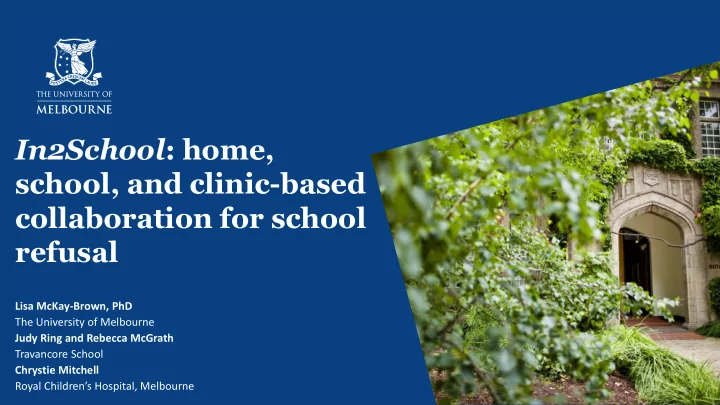

In2School : home, school, and clinic-based collaboration for school refusal Lisa McKay-Brown, PhD The University of Melbourne Judy Ring and Rebecca McGrath Travancore School Chrystie Mitchell 1 Royal Children’s Hospital, Melbourne
What is school refusal? School refusal is said to occur when: (1) a young person is reluctant or refuses to attend school, in conjunction with emotional distress that is temporal and indicative of aversion attendance, or emotional distress that is chronic and hindering attendance, usually but not necessarily manifest in absence; and (2) the young person does not try to hide associated absence from their parents , and if they previously hid absence then they stopped doing so one the absence was discovered; and (3) the young person does not display severe antisocial behaviour , beyond resistance to parental attempts to get them to school; and (4) the parents have made reasonable efforts , currently or at an earlier stage of the problems, to secure attendance at school, and/or the parents express their intention for their child to attend school full-time. (Heyne, Gren Landell, Melvin, & Gentle Genitty, 2019, p. 22)
Tiered responses to School Attendance Problems Kearney and Graczyk (2014)
Wraparound model of care • Defined planning process used to build constructive relationships and support networks • Emerged from work with young people and families in cases involving emotional and behavioral disorders • Community-based, culturally relevant, individualised, strengths-based, and family- centered • Intervention plans address multiple life domains across home, school, and community • Delivers specific interventions where there is a highly disproportionate level of risk factors relative to protective factors (Eber et al., 2008; Eber et al., 2009). 4
Phase 1 Phase 2 Phase 3 Relationship Therapeutic & Return to building and educational mainstream assessment programs school delivered in transitional classroom
Intervention Therapy Education 7
8
Return to school plans Recommended Timeline Attendance expected on the In2School Program Monday – Thursday, and a negotiated attendance at base school on a Friday until the end of the year, except… Week… Monday Tuesday Wednesday Thursday Friday I2S I2S I2S I2S Base Base I2S I2S I2S Base Base I2S I2S Base Base Base Base I2S Base Base Return to School meeting Return to I want to catch up on all school work I’ve missed School Goals I want school staff to understand how to best support me when I am feeling overwhelmed, whilst still treating me normally. PE teacher – Break Card – X will hand it in – no questions asked – then X will rejoin after the activity. 9
Who are the students? Aged 11-15 years (M=13.29, SD=0.94 ) Male = 14; Female = 30; Gender diverse = 4 Type of attendance Students Not at school 32 1-2 days per week 6 2-3 days per week 3 Public = 38; Catholic = 9; Private = 1 3-4 days per week 7 10
Health of the Nation Outcome Scales for Children and Adolescents
Quality of life - student
Quality of life - parent
Parent work within a wraparound response • Psycho-education • Positive and negative consequences • Family of origin – learnt parenting styles • Emotional blocks for parents • Boundary setting • Keeping parents accountable • Parent roster • In-home role modelling.
So what’s happened? • Attendance in In2School classroom - 86% • Average attendance 6 months after return to mainstream school - 71% (Range 2%-100% attendance) • Qualitative data shows that parents and young people are highly satisfied with the program • Student voice data is providing information on barriers to and facilitators for returning to school
Kate 16
Questions? lisamb@unimelb.edu.au @lisa_mckaybrown www.insa.network T: @INSAttendance 17
Recommend
More recommend